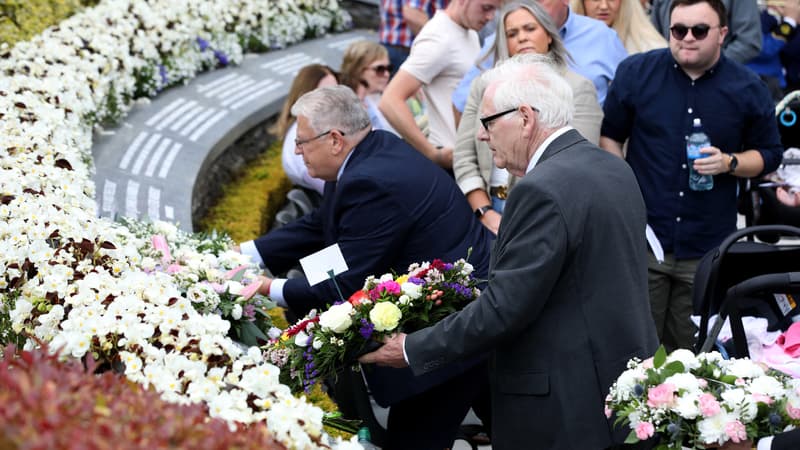Relatives of victims, survivors and politicians gathered this Sunday to commemorate the 25th anniversary of the Omagh attack, the deadliest of the Northern Ireland conflict, amid political and security tensions in the British province.
On 15 August 1998, a car bomb, planted by dissident republicans, exploded in the bustling center of Omagh, killing 29 people and injuring 220. The attack took place four months after the signing of the Good Friday Agreement, which It was supposed to end three decades of violence between unionists (mostly Protestants) and republicans (mostly Catholics) in Northern Ireland, a conflict that has left more than 3,000 dead.
To mark the anniversary, a memorial service organized by victims’ groups was held in the small town in central Northern Ireland. A private ceremony for families will also be arranged on Tuesday, August 15.
Perpetrated by the True IRA, a splinter group that opposes peace, during an IRA (Irish Republican Army) ceasefire, the attack rallied much public opinion in favor of the peace deal.
Among the victims were both Catholics and Protestants, a pregnant woman and many young people, including two Spanish tourists. A quarter of a century later, after years of legal disputes and investigations, no one has been convicted of the attack.
The memorial service featured traditional music performed with Irish bagpipes, hymns and prayers in English, Spanish and Irish. The names of the 29 victims were read and a minute’s silence was observed in their memory.
Michael Gallagher, whose son Aidan was killed in the attack aged 21, thanked “those we have lost along the way and who have helped rebuild the hearts and minds of those affected by this atrocity.”
He called the monument “a powerful testament to community spirit and cohesion, 25 years after our little town was torn apart.”
independent investigation
Jonathan Caine, the British Minister in the Ministry in charge of Northern Ireland, as well as Peter Burke, the Irish Defense Minister, took part in the commemorations in Omagh.
In February, the British government announced the opening of an independent investigation to determine whether the attack could have been prevented, after the Belfast High Court judged this hypothesis “plausible” in 2021.
A quarter of a century after the end of the “Troubles”, Brexit has reignited tensions in the British province.
The commemorations take place while the political institutions resulting from the peace agreement have been paralyzed for a year and a half, with the main unionist party (DUP) refusing to participate in the executive.
Opposed to post-Brexit trade rules that it says threaten the province’s ties with the rest of the UK, the DUP has been boycotting local institutions, believed to be shared with Republican Sinn Fein, for more one year old the province.
From a security point of view, a policeman was the target of an assassination attempt in February in the suburb of Omagh. Following this attack, the British government raised the level of terrorist threat in the province.
The attempted murder of John Caldwell, a member of the police force for 26 years, had been unanimously condemned in Northern Ireland. Claimed by the Nouvelle IRA group, he recalls that the police, a regular target during the conflict in Northern Ireland, may still be in the crosshairs.
The last police officer to be killed by Republican dissidents, Ronan Kerr, was killed in Omagh in 2011 when a car bomb exploded outside his home.
Source: BFM TV


